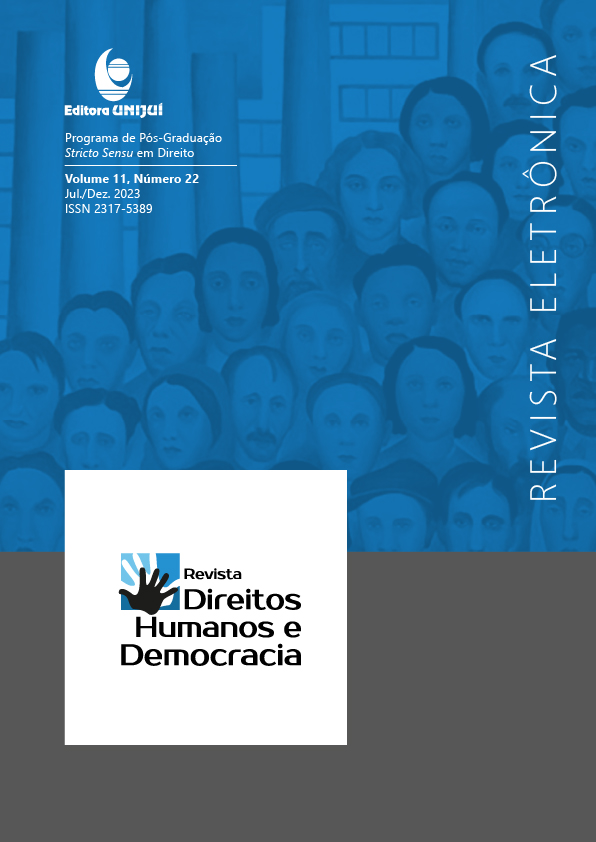Podemos falar em “Crise da democracia brasileira”? Das possíveis causas e propostas para o fortalecimento democrático
DOI:
https://doi.org/10.21527/2317-5389.2023.22.13529Palavras-chave:
Democracia brasileira, Populismo, Autocratização, Subversão sub-reptíciaResumo
O tema do presente artigo é a democracia brasileira e os problemas que enfrenta no cenário político atual sob os auspícios de uma “crise da democracia liberal”. O trabalho objetiva aprofundar o panorama atual da democracia brasileira, o que será feito por pesquisa bibliográfica e documental. Propõe-se alguns questionamentos: Quão grave e o que significa viver uma crise democrática? Quais as razões? Quais possíveis soluções para a reversão do quadro? Quais os principais inimigos da democracia brasileira na atualidade? Concluiu-se, primeiro, que a crise da democracia é uma crise que pode ser associada a um movimento de autocratização e subversão sub-reptícia da democracia, praticado notadamente por governos populistas, que, em um cenário de insucesso econômico, corrupção e desconfiança generalizada, ganham apoio e força. Em segundo, o ambiente institucional vivenciado ainda aspira valores democráticos, mas há uma forte tendência de que isso seja afetado negativamente no futuro.
Referências
APPLEBAUM, Anne. El ocaso de la democracia. La seducción del autoritarismo. [S. l.]: Debate, 2021.
BRASIL. Tribunal Superior Eleitoral. Partidos registrados no TSE. 2021. Disponível em: https://www.tse.jus.br/partidos/partidos-registrados-no-tse. Acesso em: 19 dez. 2021.
CASTELLS, Manuel. Ruptura. A crise da democracia liberal. Rio de Janeiro: Zahar, 2018.
GOMES, Pedro Henrique; BORGES, Beatriz; OLIVEIRA, Paloma. Após dois anos sem partido, Bolsonaro se filia ao PL, nona legenda da carreira política. G1. 30 nov. 2021. Disponível em: https://g1.globo.com/politica/noticia/2021/11/30/apos-dois-anos-sem-partido-bolsonaro-se-filia-ao-pl-nona-legenda-da-carreira-politica.ghtml. Acesso em: 19 dez. 2021.
LAPOP. Opinião pública brasileira e seu lugar no Barômetro das Américas. 2019. Disponível em: http://www.cepesp.io/uploads/2019/06/VozesBrasil_LAPOP_DisseminationBrazil_June2019.pdf. Acesso em: 19 dez. 2021.
LATINOBARÓMETRO. Informe 2021. 2021. Santiago de Chile. Disponível em: https://www.latinobarometro.org/latOnline.jsp. Acesso em: 19 dez. 2021.
LEVITSKY, Steven; ZIBLATT, Daniel. Como as democracias morrem. Rio de Janeiro: Zahar, 2018.
MOUNK, Yascha. O povo contra a democracia. Porque nossa liberdade corre perigo e como salvá-la. São Paulo: Companhia das Letras, 2019.
O’DONNEL, Guillermo. Notas sobre la democracia en América Latina. In: Programa de las Naciones Unidas para el Desarrollo – PNUD. La democracia en América Latina. Hacía una democracia de ciudadanas y ciudadanos. Buenos Aires: Aguilar: Altea: Taurus: Alfaguara, 2004. p. 11-73.
PRZEWORSKI, Adam. Crises da democracia. Rio de Janeiro: Zahar, 2020.
RANCIÈRE, Jacques. O desentendimento político e a filosofia. São Paulo: Editora 34, 1996.
RUNCIMAN, David. Como a democracia chega ao fim. São Paulo: Todavia, 2018.
THE ECONOMIST INTELLIGENCE UNIT. Democracy index 2020. In sickness and in health. 2020. Disponível em: https://pages.eiu.com/rs/753-RIQ-438/images/democracy-index-2020.pdf. Acesso em: 19 dez. 2021.
V-DEM INSTITUTE. Autocratization turns viral. Democracy report 2021. 2021. Disponível em: https://www.v-dem.net/media/filer_public/74/8c/748c68ad-f224-4cd7-87f9-8794add5c60f/dr_2021_updated.pdf. Acesso em: 19 dez. 2021.
Downloads
Publicado
Como Citar
Edição
Seção
Licença
Copyright (c) 2023 Revista Direitos Humanos e Democracia

Este trabalho está licenciado sob uma licença Creative Commons Attribution 4.0 International License.
Ao publicar na Revista Direitos Humanos e Democracia, os autores concordam com os seguintes termos:
Os trabalhos seguem a licença Creative Commons Atribuição 4.0 Internacional (CC BY 4.0), que permite:
Compartilhar — copiar e redistribuir o material em qualquer meio ou formato;
Adaptar — remixar, transformar e criar a partir do material para qualquer fim, inclusive comercial.
Essas permissões são irrevogáveis, desde que respeitados os seguintes termos:
Atribuição — os autores devem ser devidamente creditados, com link para a licença e indicação de eventuais alterações realizadas.
Sem restrições adicionais — não podem ser aplicadas condições legais ou tecnológicas que restrinjam o uso permitido pela licença.
Avisos:
A licença não se aplica a elementos em domínio público ou cobertos por exceções legais.
A licença não garante todos os direitos necessários para usos específicos (ex.: direitos de imagem, privacidade ou morais).
A revista não se responsabiliza pelas opiniões expressas nos artigos, que são de exclusiva responsabilidade dos autores. O Editor, com o apoio do Comitê Editorial, reserva-se o direito de sugerir ou solicitar modificações quando necessário.
Somente serão aceitos artigos científicos originais, com resultados de pesquisas de interesse que não tenham sido publicados nem submetidos simultaneamente a outro periódico com o mesmo objetivo.
A menção a marcas comerciais ou produtos específicos destina-se apenas à identificação, sem qualquer vínculo promocional por parte dos autores ou da revista.
Contrato de Licença: Os autores mantém os direitos autorais sobre seu artigo, e concedem a Revista Direitos Humanos e Democracia o direito de primeira publicação.













